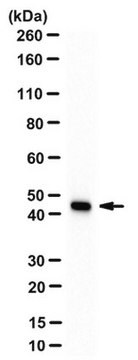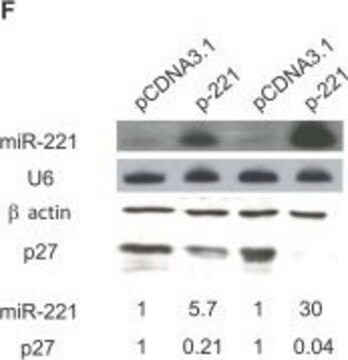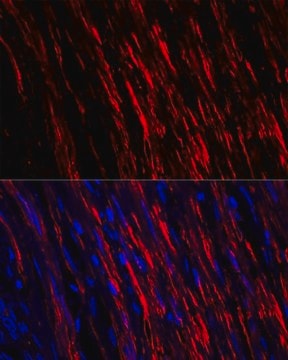CBL171
Anti-α-Smooth Muscle Actin (ACTA2) Antibody,
CHEMICON®, mouse monoclonal, ASM-1
Sinónimos:
Alpha-actin-2
About This Item
Productos recomendados
Nombre del producto
Anti-Actin Antibody, smooth muscle, clone ASM-1, clone ASM-1, Chemicon®, from mouse
origen biológico
mouse
Nivel de calidad
forma del anticuerpo
purified immunoglobulin
tipo de anticuerpo
primary antibodies
clon
ASM-1, monoclonal
reactividad de especies
chicken, mouse, horse, rat, human, bovine
fabricante / nombre comercial
Chemicon®
técnicas
immunofluorescence: suitable
immunohistochemistry (formalin-fixed, paraffin-embedded sections): suitable
western blot: suitable
isotipo
IgG2a
Nº de acceso NCBI
Nº de acceso UniProt
Condiciones de envío
dry ice
modificación del objetivo postraduccional
unmodified
Información sobre el gen
human ... ACTA2(59)
Descripción general
Especificidad
Inmunógeno
Aplicación
1:2000 dilution of a previous lot was used on frozen and formalin-fixed, paraffin-embedded tissues; protease pretreatment is recommended for paraffin-embedded sections.
Immunofluorescence:
A previous lot of this antibody was used on Immunofluoresence.
Optimal working dilutions must be determined by the end user.
Cell Structure
Cytoskeletal Signaling
Calidad
Western Blot Analysis:
1:1000 dilution of this antibody detected ACTIN, SM MUSC on 10 μg of HUVEC lysates.
Descripción de destino
Ligadura / enlace
Forma física
Final solution is PBS, pH 7.4, containing 0.5% BSA and 0.09% sodium azide.
Almacenamiento y estabilidad
Handling Recommendations: Upon first thaw, and prior to removing the cap, centrifuge the vial and gently mix the solution. Aliquot into microcentrifuge tubes and store at -20°C. Avoid repeated freeze/thaw cycles, which may damage IgG and affect product performance.
Nota de análisis
Positive reaction using stress fibers of smooth muscle-derived cells and some smooth muscle subtype fibroblasts.
Información legal
Cláusula de descargo de responsabilidad
¿No encuentra el producto adecuado?
Pruebe nuestro Herramienta de selección de productos.
Palabra de señalización
Warning
Frases de peligro
Consejos de prudencia
Clasificaciones de peligro
Acute Tox. 4 Dermal - Acute Tox. 4 Inhalation - Aquatic Chronic 3
Código de clase de almacenamiento
11 - Combustible Solids
Clase de riesgo para el agua (WGK)
WGK 3
Certificados de análisis (COA)
Busque Certificados de análisis (COA) introduciendo el número de lote del producto. Los números de lote se encuentran en la etiqueta del producto después de las palabras «Lot» o «Batch»
¿Ya tiene este producto?
Encuentre la documentación para los productos que ha comprado recientemente en la Biblioteca de documentos.
Nuestro equipo de científicos tiene experiencia en todas las áreas de investigación: Ciencias de la vida, Ciencia de los materiales, Síntesis química, Cromatografía, Analítica y muchas otras.
Póngase en contacto con el Servicio técnico









